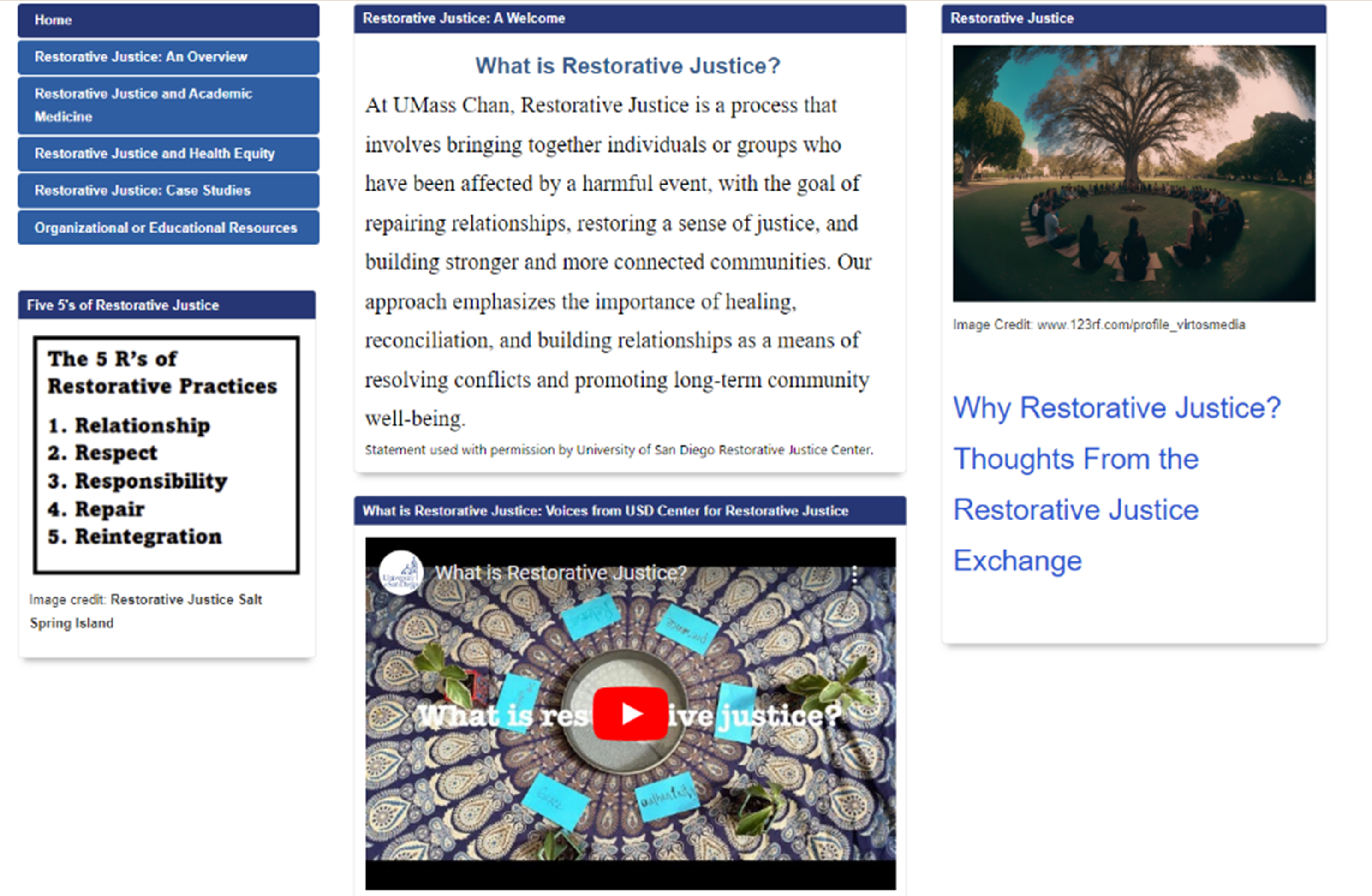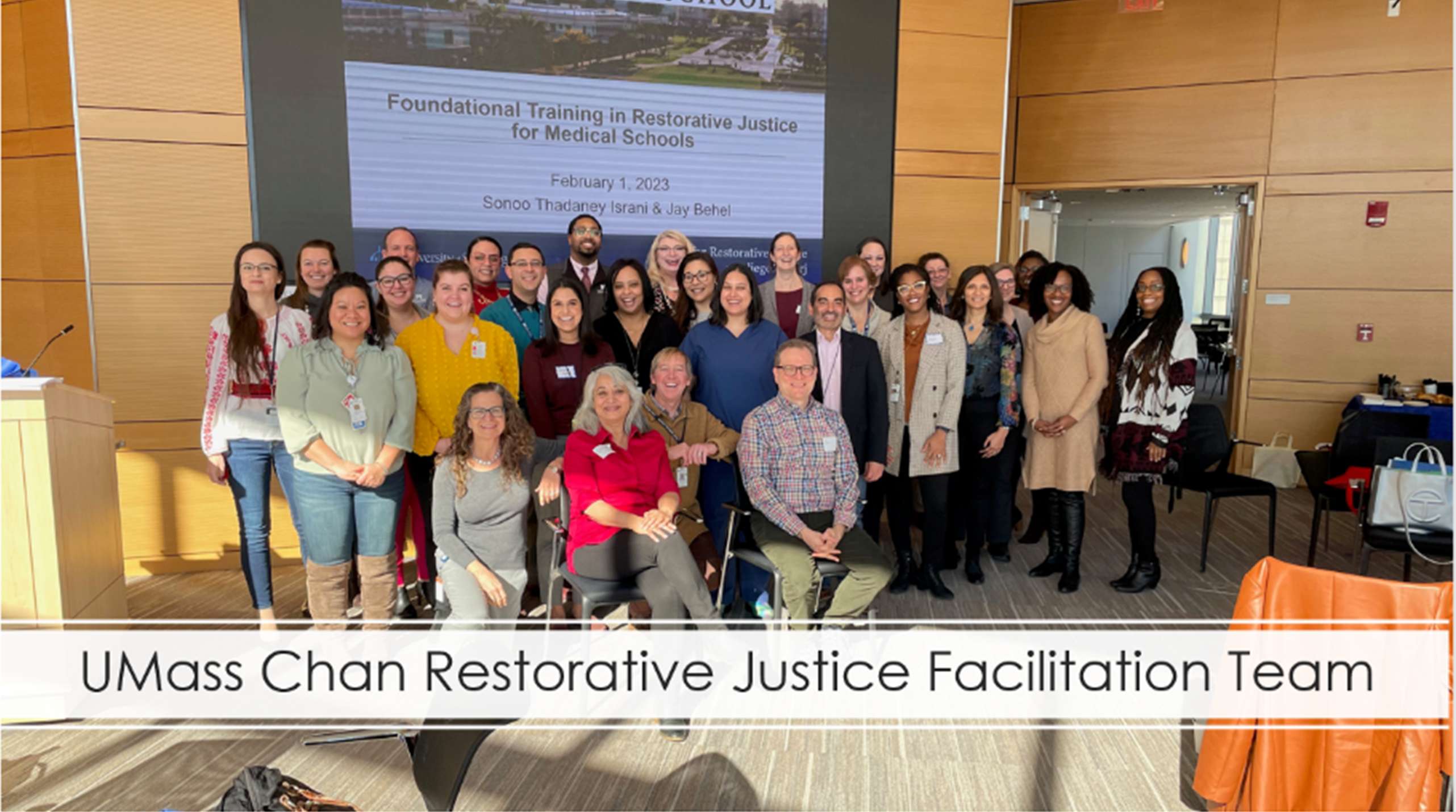Restorative Justice @ UMass Chan Medical School
What is Restorative Justice?
Restorative Justice (RJ) is a way to prevent or respond to harm or an incident in a community with an emphasis on healing, social support, and active accountability. RJ includes a variety of practices with many rooted in indigenous traditions. Some practices help prevent harm by helping people build relationships and strengthen communities. Other practices respond to harm by helping to clearly identify harms, needs, and solutions through an inclusive and collaborative decision-making process (University of San Diego Center for Restorative Justice, 2023).
UMass Chan is committed to sustaining a campus culture in which each individual's humanity and dignity are acknowledged and institutional resources are available equitably. This process is grounded in the principles of active and accountable conflict resolution, community building, and healing. One that offers a structure that helps establish a safe and supportive space intended to promote authentic and equitable conversation through a collaborative decision-making process, resulting in both individual and community healing.
UMass Chan News story about Restorative Justice
UMass Chan Diversity Summit Restorative Justice breakout session video
Restorative Justice @ UMass Chan printable PDF.
Restorative practices
Community building circle:
In the first phase of Restorative Justice at UMass Chan, we will focus on tier I - community building. A community building or connecting and reflecting circle is a process that brings people together to build a sense of community. Community building circles prevent harm by building and strengthening relationships. Led by a trained facilitator, participants share their experiences and perspectives in a safe space, with a focus on identifying the strengths and assets of the community.
Climate circle:
A restorative justice climate circle, for example, can help departments respond to climate
concerns that may be disrupting workplace satisfaction, the learning environment or the sense of belonging.
Restorative Justice to respond to harm/conflict:
Led by a trained facilitator, this dialogue provides a safe space for participants to share their
experiences, feelings and perspectives, with a focus on repairing harm and restoring
relationships following an incident. The goal is to reach a resolution that is acceptable to all
parties involved, and that addresses harm or conflict in a way that is respectful, healing,
empathic, and sustainable.
One page printable document about Restorative Justice at UMass Chan
Restorative Justice @ UMass Chan
All facilitators listed below attended the three-day training seminar at the end of January 2023 that was organized by the University of San Diego's Center for Restorative Justice and was customized exclusively for an academic health science center like UMass Chan. These are the facilitators that we call upon to help with the Restorative Justice process and to create circles.
| Name | Department |
| Acosta, Alan A | Student Life |
| Anderson, Che | Government and Community Relations |
| Bradford, Jennifer | Family Medicine and Community Health |
| Brown, Candice B | DIO |
| Brown, Holly | DIO |
| Delacruz Davila, Carla | Student Life |
| Duncan, Marlina N | DIO |
| Erwin, John | Government and Community Relations |
| Fahey, Nisha | Pediatric Residency |
| Fischer, Melissa | General Medicine and Primary Care |
| Green, Emily P | Faculty Administration |
| Haley, Heather-Lyn | Family Medicine and Community Health |
| Hernández, Lynn | DIO |
| Ireland, Luu | Obstetrics Group |
| Kumaraswami, Tara | Obstetrics and Gynecology |
| Lee, Jeanna | General Medicine and Primary Care |
| Malatesta, Thin | Tan Chingfen Graduate School of Nursing Administration |
| Mehta, Tejas | Radiology |
| Munson, Mary | Biochemistry and Molecular Pharm |
| Peterson, Kenneth | Tan Chingfen Graduate School of Nursing Administration |
| Pierce, Clanford | Public Safety |
| Powell, Monick | Pediatric Residency |
| Printy, Angela | DIO |
| Radu, Irina | Cardiovascular Medicine |
| Sanchez, Jorge | DIO |
| Stickney, Katherine | Student Life |
| Warren, Celestine | Graduate Medical Education |
Our process using tier I community building Restorative Justice:
Step 1: Desire for community building, the building block of implementing RJ
Step 2: Notify DIO via Restorative Justice form or email
Step 3: DIO will identify trained facilitators through our community of practice
Step 4: All parties must agree to a restorative conversation
Step 5: A tier I - community building session will be scheduled
Contact executive sponsor Lynn Hernández, PhD, in the Diversity and Inclusion Office by email: RestorativeJustice@umassmed.edu or call: 508-856-2179.
Lamar Soutter Library Guide to Restorative Justice
Restorative Justice organizations
- UC San Diego Center for Restorative Justice
- International Institute for Restorative Practices
- Restorative Justice Council (UK)
- Restorative Justice on the Rise
Restorative Justice books
- Restorative Justice: Healing the Foundations of Our Everyday Lives
- The Little Book of Restorative Justice in Schools: Fostering Responsibility, Healing, and Hope in Education
- Restorative Justice: A Critical Introduction
Restorative Justice videos
- "The Power of Restorative Justice" TED Talk by Howard ZehrYouTube
- "Using Restorative Practices to Address Communal Harm, Internationally", hosted by Harvard Negotiation Law Review this panel was moderated by Andrew Mamo and featured speakers Dr. Ronan Feehily, Thalia Gonzalez, and Libby Hoffman
